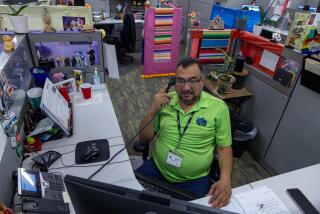‘I like to let them know that they’re lovable no matter what kinds of mistakes they have made’
- Share via
Remembering the trying times he went through in school, drug outreach counselor Kirt Baab says he thinks high school is the toughest experience for young people. Baab, an Encinitas resident, said he was directionless as a young man until an adult took the time to work on his self-esteem. He earned master’s degrees in psychology and chemical dependency treatment after his mentor convinced him he was “college material.” Knowing he wanted to help kids, Baab first worked for San Diego County Child Protective Services and on a suicide hot line before taking a job as a counselor at Scripps Memorial Hospital a few years ago. Now part of the Oasis program at Scripps’ McDonald Center for alcoholism and drug abuse in La Jolla, he visits several San Diego area schools to counsel young drug and alcohol abusers daily during the school year. Baab plans to earn his doctorate in clinical psychology but says he will always work with teen-agers. He was interviewed at a high school by Times staff writer Terry Rather and photographed by Barbara Martin Pinhero.
It was a real lonely time for me when I was in high school. I felt like I was an outsider, like I couldn’t connect with other people, even though I played sports and had a girlfriend.
I went to the prom, that kind of stuff, and had a bunch of friends that I hung out with, but still it was the most uncomfortable time of my life.
As a result, I really appreciated it when some people stuck their noses into my life and said, “Hey, what’s going on? I want to help.” I realized that, when people get involved professionally to help someone, like a counselor or a teacher or nurse, the relationship doesn’t always stop at the end of the work day.
They can convey through their work a genuine love and affection for the people they are serving. That made me realize there wasn’t anything wrong with me. I was just frustrated in school, and it was so hard for me to find that. I ended up studying psychology so I could give to others.
When the opportunity came to work at the McDonald Center, I grabbed it because I knew I’d really be able to connect with kids in a place I wanted to and help them find a way to fill up the empty spot themselves.
It’s all a way of giving kids a sense of belonging, giving them some idea about having some meaning in their lives, some kind of structure to work with. It’s really a kick to watch kids discover how it really fits, to see them make sense out of it.
In last few years the schools have been making a greater effort to help kids and families who use drugs. There’s this real misconception that everyone who does drugs is alike. That’s not true.
Very often teen-agers and parents get into this power struggle. Parents say they can’t help him, and the kid argues, well, I have to make up my own mind, it’s my own choice.
I like to let them know that they’re lovable no matter what kinds of mistakes they have made, like getting in trouble with drugs, with authorities or their parents, and that mistakes can be worked out. I let them know there are people who have been in the same kinds of trouble. I show them how they can get help.
Sometimes I meet with their families if they’re scared to tell them they need help. If the parents don’t want to hear it and can’t quite accept it, which is the case more often than I thought it would be, I’ll meet with the parents a couple more times.
There’s an enormous amount of benefit that can come for parents and children if they sit down and talk to someone who knows how to help them untangle themselves from the net that they got themselves caught in.
People learn how to talk to each other about things they’ve been keeping secret. And when they find that they don’t have to keep things secret any more, the fear of discovery and the guilt goes away, and all of a sudden the doors open and a lot of love flows around the family. That heals people. People stop doing drugs. People start getting jobs, going to school, playing together again.
Usually I feel like all the work--all the times a kid gets mad at me because I’m talking to him about drugs and they don’t want to talk about it--is all worthwhile because I can see the changes in the kids take place, one week, one month, three months down the road.
It’s because they’re willing to do it that it really makes me believe there is such a thing as a human spirit, and that spirit will triumph over adversity.






